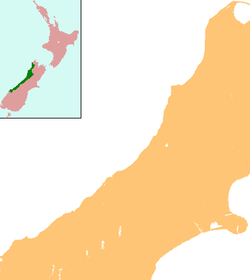Ruatapu, New Zealand
Ruatapu | |
|---|---|
 Ruatapu, with Lake Mahinapua shown in the foreground, and the Tasman Sea in the background. | |
| Coordinates: 42°48′21″S 170°53′20″E / 42.80583°S 170.88889°E | |
| Country | New Zealand |
| Region | West Coast |
| District | Westland District |
| Electorates | West Coast-Tasman Te Tai Tonga |
| Time zone | UTC+12 (NZST) |
| • Summer (DST) | UTC+13 (NZDT) |
| Postcode | 7883 |
| Area code | 03 |
| Local iwi | Ngāi Tahu |
Ruatapu is a small town in the Westland District in the West Coast region of the South Island of New Zealand. The town's name stems from Ruatapu, a figure in Māori mythology. The town is located on a narrow strip of land between the Tasman Sea and Lake Mahinapua, a shallow lake that was originally a coastal lagoon. State Highway 6 runs through Ruatapu, connecting it to the nearby towns of Hokitika and Ross. The town's economy is based upon agriculture, as well as a large sawmill, operated by Westco Lagan, which mills Radiata Pine for further processing in Christchurch.[1]
History
[edit]Railway
[edit]On 9 November 1906, the Midland railway line, running from Greymouth to Hokitika, extended a branch line to Ruatapu. Ruatapu acted as the terminus of the railway until 1 April 1909, when it was opened to Ross, and became known as the Ross Branch. Passenger services ceased on 9 October 1972 and the line closed to all traffic on 24 November 1980. Some of the track bed near Ruatapu can now be driven.[2]
Sawmill and tramway
[edit]Joseph Butler bought 28,000 acres (11,000 ha) of rimu, matai and kahikatea bush, between Ruatapu and Ross, for £28,000 in 1907. With his brother William, he formed Butler Brothers Ltd, with the Kauri Timber Co as a major shareholder. A large steam-powered sawmill worked from 1911.[3] A large storm in October 1915 ripped the roof off the sawmill, demolished a hut, and shifted another house from its foundations.[4] An electric-powered mill was built in 1955 after the original had burnt down in 1952 and was rebuilt again after another fire in the early 1980s.[3]
Fletcher Holdings took over the mill in 1961, sold it to Henderson & Pollard Ltd in 1979 and they became part of Carter Holt Harvey in 1987. In 1988 the mill was sold to Westco Lagan Ltd.[3]
Tramways ran up to 20 km (12 mi) south from the mill until replaced by logging trucks in 1960.[3]
References
[edit]- ^ Operations – Westco Lagan Limited. Retrieved 18 June 2012.
- ^ David Leitch and Brian Scott, Exploring New Zealand's Ghost Railways, revised edition (Wellington: Grantham House, 1998 [1995]), 60-1.
- ^ a b c d Carter, Graeme (February 2019). "The enterprising Butler brothers". NZ Railway Observer: 245–253.
- ^ STORM IN NEW ZEALAND TOWN. – Warrnambool Standard. Published 21 October 1915. Retrieved 18 June 2012.

